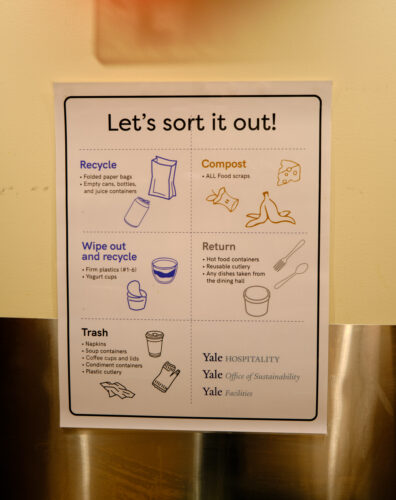Image Courtesy of Amy Boote.
Sitting down for a meal at the dining hall may seem like an inconsequential part of every Yale student’s daily routine. But when the leftovers of our meals are tallied up, the impact is striking. The US Department of Agriculture estimates that thirty to forty percent of food is wasted nationwide. Every day, approximately twelve thousand meals are doled out by Yale Hospitality across dining facilities on campus. No matter how good the Yale dining hall food is, waste is inevitable.
However, Yale believes we can do better. Beginning on March 1, the Yale Hospitality Culinary Support Center and all residential dining hall kitchens implemented AI technology as part of a new sustainability initiative to reduce food waste. Daniel Flynn, director of asset renewal at Yale Hospitality, describes the system as an aid to making sustainable purchasing decisions for dining halls.
The system operates as follows: when food waste is discarded, AI-powered cameras and scales keep track of the disposed food items. This information is then used to optimize how food is purchased, prepared, and served, allowing for more efficient use of ingredients. “It’s similar to the previous system in terms of convenience,” one diner at Timothy Dwight’s dining hall said.
But how effective is this system? In April, the new technology was used behind the scenes in the dining hall kitchens and central culinary center, greatly reducing food waste. At the beginning of fall 2024, a front-of-house system was introduced in Timothy Dwight College’s dining hall as a trial run. Ultimately, Yale’s goal is to decrease food waste by twenty percent in 2024 and thirty percent in 2025. With the assistance of AI, this seems more possible than ever.

